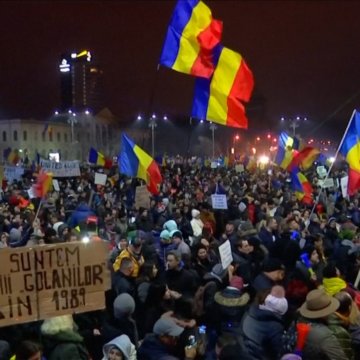- About
- Topics
- Story
- In-Depth
- Picks
- Opinion
- News
- Donate
- Signup for our newsletterOur Editors' Best Picks.Send
Read, Debate: Engage.
Victory Square, in the heart of Bucharest, where the headquarters of the Romanian Government is located, is quickly becoming a symbol of the people's struggle against the increasingly authoritarian drift of their country’s government.
Exasperated by endemic levels of corruption and the deterioration of the judiciary power, thousands of Romanians took to the streets last week in protests demanding the resignation of the Government and Prime Minister Viorica Dancila. Many of the protestors were Romanians who had emigrated to other European countries, some of which travelled thousands of miles to join the protests.
Yet the heavy-handed reaction to the peaceful protests demonstrates by the Bucharest authorities show that the government is not willing to listen to its citizens' demands. On Friday night, riot police intervened the peaceful protests with violence, firing tear gas and using a water cannon indiscriminately, resulting in more than 450 injuries, including several journalists, according to officials. The brutality of the security forces was also condemned by President Klaus Iohannis, who said the intervention had been “strongly disproportionate”.
With the gathering of over 100 thousand people, last week’s demonstrations were the largest since February 2017, when Romania witnessed a wave of social unrest against corruption and the ruling coalition of the Social Democrats and Liberals. Protestors are concerned with the Romanian Government’s curtailing of democracy and what the public considers are attempts by the Government to limit the rule of law in the country.
The Romanian public is particularly concerned about the recent changes proposed by the Government to amend the Criminal Code in order to ease penalties for crimes related to corruption and abuse of power. The judiciary reform has equally been criticised by the European Union, concerned that it could limit the independence of judges and prosecutors.
One of the beneficiaries of the reform is former deputy Prime Minister Liviu Dragnea, now head of the ruling Social Democrats party, who has been sentenced to 3 and a half years in prison for abuse of power. Despite the country's recent struggles to uphold justice, Dragnea continues to be regarded as the most powerful man in the country, with suspicions that he is behind the proposed amendments to the Penal Code and the recent dismissal of the anti-corruption prosecutor, Laura Codruta Kovesi, a symbol of the fight against corruption in the country.
Since Dragnea's election as party leader in 2013, more than 1000 politicians of different political colours have been taken to trial, while Kovesi was fired in early July amid accusations of constitutional violations.
Romanians are, therefore, refusing to see their country slide into an authoritarian state, as indicated by the most recent violent government retaliation. As long as the wave of authoritarianism continues, it is certain that the protests will keep the pressure high in a fight against corruption that is showing no signs of slowing down.
